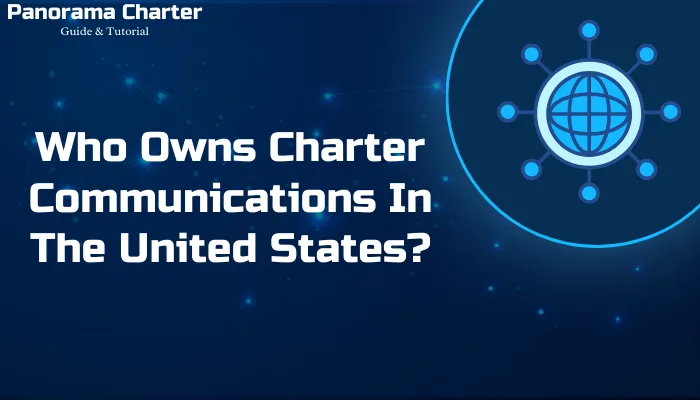The complicated world of telecommunications has a big influence on how we live our everyday lives. We may gain insight into the goals and decision-making processes of these organizations by knowing who owns them. This article explores the ownership structure of Charter Communications, a major cable provider and provider of internet access in the United States with millions of subscribers.
Have you ever wondered Who Owns Charter Communications In The United States? This well-known company in the telecom sector offers phone, cable TV, and internet services to a sizable client base all throughout the country. But just who is in charge of this enormous enterprise?

The Importance of Ownership
For a number of reasons, it is essential to comprehend the ownership structure of a telecommunications firm such as Charter Communications. It clarifies:
- Decision-Making: Knowing who is in charge enables us to hold the business accountable for its actions and the caliber of its services.
- Accountability: Knowing who is in charge allows us to hold the business accountable for its direction, investment strategies, and general approach to the market. Transparency: A transparent ownership structure fosters trust with investors and customers.
The goal of this page is to give a thorough rundown of Charter Communications’ owners. We’ll go into the many kinds of shareholders, talk about ownership in publicly listed corporations, and look at their voting rights and overall power.
Who Owns Charter Communications In The United States?
In contrast to a modest, family-run enterprise, Charter Communications is a publicly listed corporation. This indicates that ownership is not vested in a select few or in the hands of one individual. Rather, ownership of the business is split up into shares, which are traded on stock markets.
The Variable Shareholder Landscape
At Charter Communications, stockholders fall into a number of categories:
Large blocks of shares held on behalf of clients by investment companies, mutual funds, and pension funds are referred to as institutional investors.
Individual investors may also buy Charter Communications shares, allowing them to become individual shareholders.
- Liberty Broadband Corporation: This business, which is controlled by billionaire John Malone, has a large stake in Charter Communications, giving them a lot of sway.
Influence of Shareholders and Voting Rights
Not every share is made equally. Voting rights are attached to some classes of shares, giving owners the ability to influence corporate decisions on things like board elections and significant purchases. The weight of an investor’s vote is based on the amount of shares they possess.
Consequently, Liberty Broadband Corporation and big institutional investors can have a lot of influence on Charter Communications because of their substantial ownership stakes.
This brings an end to our initial investigation into Charter Communications’ ownership. We will go into more detail about the particular organizations that possess shares in the business in the next section.
Exposing the Ownership Hierarchy
After defining the various ownership positions in a publicly listed corporation such as Charter Communications, let’s get to know the main players:
Important Charter Communications Stakeholders
As was previously indicated, one notable large shareholder in Charter Communications is Liberty Media Corporation, which is under the ownership of media billionaire John Malone. Liberty Media has a sizable voting position through a variety of assets, giving them a great deal of control over the company’s course.
Institutional Funders: Creating the Environment
Investment firms, mutual funds, pension funds, and other institutional investors own a significant amount of Charter Communications’ shares. Because of their influence and voting power, these organizations are vital in determining how the firm makes choices.
A summary of a few well-known institutional investors is as follows:
- BlackRock Inc. State Street Corporation Fidelity Management & Research Company LLC The Vanguard Group
These are but a handful of the numerous institutional investors who own shares in Charter Communications. They may have a big impact on the board makeup, general performance, and strategic direction of the firm because of their combined ownership and voting power.
Individual Investors’ Power
Even though private investors may not own as many shares as institutional giants, their combined ownership is still significant. By purchasing and selling stocks, individual investors may affect stock prices and contribute to the mood of the market as a whole.
A Juggling Act: Power and Persuasion
It’s critical to realize that ownership of Charter Communications does not equate to total control by one organization. The several parties involved maintain a precarious power balance:
- Individual Investors: Contribute to price swings and general market sentiment. * Institutional Investors: Collectively wield sway via voting power and market impact. * Liberty Media: Exercises substantial influence through its voting share.
The way these stakeholders interact determines the strategic direction of Charter Communications and maintains a certain level of responsibility inside the organization.
Our investigation into Charter Communications’ ownership structure is now complete. We’ve revealed the many kinds of shareholders, their ranges of power, and the precarious power dynamics inside the organization. We may learn a great deal about the dynamics behind this massive telecoms company by knowing who controls Charter Communications.
Principal Investors in Charter Communications
Now that we’ve looked at the various ownership structures inside Charter Communications, let’s get to know the people who actually hold the shares. This section explores the company’s largest shareholders, the organizations that control a sizable portion of the stock and shape its course.
A. The Powerhouse Players: Institutional Investors
The powerful players in the ownership stakes of Charter Communications are institutional investors. These organizations, which include pension funds, mutual funds, and investment firms, own a sizable number of shares amongst them and hence have significant decision-making power over the business.
1. Institutional Ownership Overview
major quantities of money are managed by institutional investors on behalf of their customers, who can be major organizations looking for investment possibilities or individuals saving for retirement. They effectively become co-owners of a business like Charter Communications when they invest, and the amount of their investment affects their voting power.
2. Principal Institutional Owners in the Charter
A number of well-known institutional investors own a sizeable portion of Charter Communications. Here are a few important figures:
- The Vanguard Group: An international asset management firm well-known for its inexpensive index funds; * BlackRock Inc.: The biggest asset manager globally, providing a vast array of financial goods and services.
- Fidelity Management & Research Company LLC: a well-known mutual fund manager and investment advisor. * State Street Corporation: a top financial services provider with a significant presence in investment management.
These are but a handful of the numerous institutional investors who own shares in Charter Communications. They may have a big impact on the board makeup, general performance, and strategic direction of the firm because of their combined ownership and voting power.
B. Shareholders Individually: The Strength of Crowds
In Charter Communications’ ownership structure, ordinary shareholders are just as important as institutional investors, despite the latter’s overwhelming position. These are regular individuals who decide to purchase shares in the firm, so becoming partial owners and influencing the mood of the market as a whole.
1. Insiders and Executives
Charter Communications shares may also be held by company insiders and executives,
including board members and senior management. They are motivated by their ownership to make choices that will maximize shareholder wealth and the company’s long-term success.
2. Small-scale investors
Retail investors are members of the public who make stock market investments. Shares of Charter Communications may be acquired by them via traditional investment advisors or internet brokerage services. Even while individual retail investors usually own fewer shares than institutions do, their combined ownership has the ability to affect stock prices through their purchasing and selling actions.
Conclusion
To sum up, Who Owns Charter Communications In The United States? is a complicated web that is stitched together by individual investors, corporate insiders, and institutional giants. Gaining knowledge of these many stakeholders and the range of their impact might help you better understand the factors behind this industry leader in telecoms.
